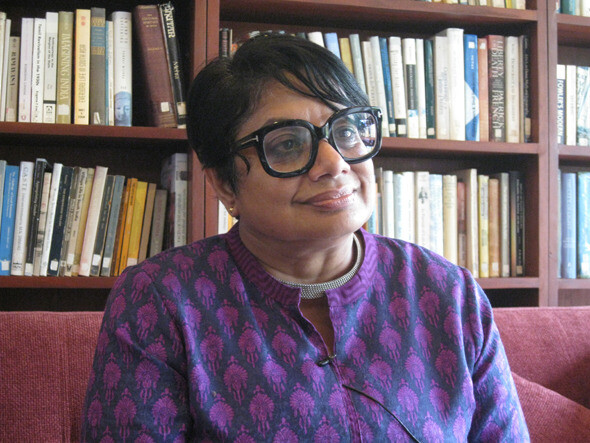hankyoreh
Links to other country sites 다른 나라 사이트 링크
Former UN special rapporteur criticizes Japan on comfort woman issue

By Yi Yong-in, staff reporter in Colombo
Radhika Coomaraswamy, former UN special rapporteur on violence against women and author of the first UN report dealing with the issue of the comfort women, published in 1996, recently expressed her concern that the Japanese government’s stance on the issue is regressing to the hard-lined position that it had held before 1995.
On Aug. 9, Coomaraswamy gave an interview to a joint group of South Korean reporters assigned to the Ministry of Foreign Affairs at her home in Colombo, capital of Sri Lanka. “During the period of when I was UN special rapporteur since 1995, we were getting there. I think at some point, they wrote a letter expressing regret,” she said. “There were also some commitments to change textbooks and setting up the Asian Women’s Fund. Of course it was not enough but at least it was a step in the right direction,” she said.
In 1996, Coomaraswamy composed a report titled “Report on the Mission to the Democratic People’s Republic of Korea, the Republic of Korea and Japan on the Issue of Military Sexual Slavery in Wartime” to the United Nations Economic and Social Council. Her report was based on investigations inside South Korea, North Korea, and Japan.
The report - which was effectively the first time the UN had fully addressed the issue of the comfort women - defined the comfort women system as sexual slavery and urged the Japanese government to acknowledge its legal responsibility and to pay compensation to the victims.
The former special rapporteur explained that the reason she had referred to the comfort women as “wartime slaves” in her report was because the conditions that the victims had described to her were the conditions of slavery. “I called it slavery because the women were controlled by someone else against their will,” she said.
Coomaraswamy also responded to a report by a Japanese government panel that reviewed the Kono Statement recently. In the report, the panel concluded that it could not confirm that the comfort women had been forced into service. “I had interviews of the former comfort women, I reviewed a lot of historical documents, and I was provided with information by Japanese women advocacy groups. When you look at all of this information together, it is clear that most of the women were compelled to work for the military,” she said.
Coomaraswamy was also asked about the claims of Japanese right-wingers that the comfort women were wartime prostitutes and the recent trend for anti-Korean demonstrations in Japan. “In any country, there can be movements that are hostile to other ethnic groups, other countries, and women, but the state is responsible for keeping these movements from expanding into demonstrations and statements of hatred for Korea,” she said, emphasizing the role of the Japanese government.
Coomaraswamy, who used to work as a lawyer in Sri Lanka, was appointed to be the special rapporteur on violence against women for the United Nations Commission on Human Rights, a subsidiary of the United Nations Economic and Social Council, in 1994, and served in that capacity until 2003. From 2006 until her retirement, she worked as the UN Secretary General’s special representative for children and armed conflict.
Please direct questions or comments to [english@hani.co.kr]

Editorial・opinion
![[Editorial] Yoon must halt procurement of SM-3 interceptor missiles [Editorial] Yoon must halt procurement of SM-3 interceptor missiles](https://flexible.img.hani.co.kr/flexible/normal/500/300/imgdb/child/2024/0501/17145495551605_1717145495195344.jpg) [Editorial] Yoon must halt procurement of SM-3 interceptor missiles
[Editorial] Yoon must halt procurement of SM-3 interceptor missiles![[Guest essay] Maybe Korea’s rapid population decline is an opportunity, not a crisis [Guest essay] Maybe Korea’s rapid population decline is an opportunity, not a crisis](https://flexible.img.hani.co.kr/flexible/normal/500/300/imgdb/original/2024/0430/9417144634983596.jpg) [Guest essay] Maybe Korea’s rapid population decline is an opportunity, not a crisis
[Guest essay] Maybe Korea’s rapid population decline is an opportunity, not a crisis- [Column] Can Yoon steer diplomacy with Russia, China back on track?
- [Column] Season 2 of special prosecutor probe may be coming to Korea soon
- [Column] Park Geun-hye déjà vu in Yoon Suk-yeol
- [Editorial] New weight of N. Korea’s nuclear threats makes dialogue all the more urgent
- [Guest essay] The real reason Korea’s new right wants to dub Rhee a founding father
- [Column] ‘Choson’: Is it time we start referring to N. Korea in its own terms?
- [Editorial] Japan’s rewriting of history with Korea has gone too far
- [Column] The president’s questionable capacity for dialogue
Most viewed articles
- 1Months and months of overdue wages are pushing migrant workers in Korea into debt
- 2Trump asks why US would defend Korea, hints at hiking Seoul’s defense cost burden
- 3At heart of West’s handwringing over Chinese ‘overcapacity,’ a battle to lead key future industries
- 4[Editorial] Yoon must halt procurement of SM-3 interceptor missiles
- 5Fruitless Yoon-Lee summit inflames partisan tensions in Korea
- 6Dermatology, plastic surgery drove record medical tourism to Korea in 2023
- 71 in 3 S. Korean security experts support nuclear armament, CSIS finds
- 8AI is catching up with humans at a ‘shocking’ rate
- 9First meeting between Yoon, Lee in 2 years ends without compromise or agreement
- 10[Guest essay] Maybe Korea’s rapid population decline is an opportunity, not a crisis